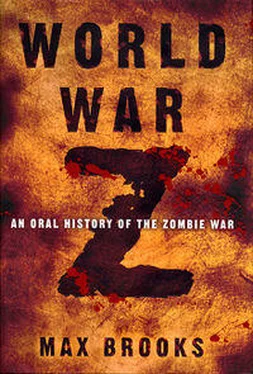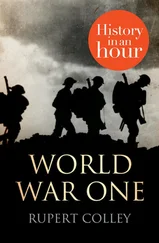The history books call it “The Honolulu Conference,” but really it should have been called the “Saratoga Conference” because that’s all any of us had a chance to see. We spent fourteen days in those cramped compartments and dank stuffy passageways. USS Saratoga: from aircraft carrier, to decommissioned hulk, to evacuee transport barge, to floating United Nations HQ.
It also shouldn’t have been called a conference. If anything, it was more like an ambush. We were supposed to be exchanging warfighting tactics and technology. Everyone was anxious to see the British method of fortified motorways, which was almost as exciting as that live demonstration of Mkunga Lalem. We were also supposed to be attempting to reintroduce some measure of international trade. That was my task, specifically, to integrate the remnants of our navy into the new international convoy structure. I wasn’t really sure what to expect from my time aboard Super Sara. I don’t think anyone could have expected what actually happened.
On the first day of the conference, we’d assembled for the introductions. I was hot and tired and wishing to God we could just get on without all the tiresome speeches. And then the American ambassador rose, and the whole world came to a screeching halt.
It was time to go on the attack, he said, to all get out from behind our established defenses and begin retaking infested territory. At first I thought he simply meant isolated operations: securing more inhabitable islands or, perhaps, even reopening the Suez/Panama canal zones. My supposition didn’t last very long. He made it very clear that this was not going to be a series of minor tactical incursions. The United States intended to go permanently on the offensive, marching forward every day, until, as he put it, “every trace was sponged, and purged, and, if need be, blasted from the surface of the Earth.” Maybe he thought ripping off Churchill would give it some kind of emotional punch. It didn’t. Instead, the room spontaneously combusted into argument.
One side asked why in hell should we risk even more lives, suffer even one more unnecessary casualty when all we had to do was remain safe and sedentary while our enemy simply rotted away. Wasn’t it happening already? Weren’t the earliest cases starting to show signs of advanced decomposition? Time was on our side, not theirs. Why not let nature do all the work for us?
The other side countered that not all the living dead were rotting away. What about the later cases, the ones still strong and healthy? Couldn’t just one restart the plague all over again? And what about those who prowled countries above the snowline? How long would we have to wait for them: Decades? Centuries? Would refugees from these countries ever have a chance of returning home?
And that’s when it got ugly. Many of the colder countries were what you used to call “First World.” One of the delegates from a prewar “developing” country suggested, rather hotly, that maybe this was their punishment for raping and pillaging the “victim nations of the south.” Maybe, he said, by keeping the “white hegemony” distracted with their own problems, the undead invasion might allow the rest of the world to develop “without imperialist intervention.” Maybe the living dead had brought more than just devastation to the world. Maybe in the end, they had brought justice for the future. Now, my people have little love for the northern gringos, and my family suffered enough under Pinochet to make that animosity personal, but there comes a point where private emotions must give way to objective facts. How could there be a “white hegemony” when the most dynamic prewar economies were China and India, and the largest wartime economy was unquestionably Cuba? How could you call the colder countries a northern issue when so many people were just barely surviving in the Himalayas, or the Andes of my own Chile? No, this man, and those who agreed with him, weren’t talking about justice for the future. They just wanted revenge for the past.
[Sighs.] After all we’d been through, we still couldn’t take our heads from out of our asses or our hands from around each other’s throats.
I was standing next to the Russian delegate, trying to prevent her from climbing over her seat, when I heard another American voice. It was their president. The man didn’t shout, didn’t try to restore order. He just kept going in that calm, firm tone that I don’t think any world leader has since been able to duplicate. He even thanked his “fellow delegates” for their “valued opinions” and admitted that, from a purely military perspective, there was no reason to “push our luck.” We’d fought the living dead to a stalemate and, eventually, future generations might be able to reinhabit the planet with little or no physical danger. Yes, our defensive strategies had saved the human race, but what about the human spirit?
The living dead had taken more from us than land and loved ones. They’d robbed us of our confidence as the planet’s dominant life-form. We were a shaken, broken species, driven to the edge of extinction and grateful only for a tomorrow with perhaps a little less suffering than today. Was this the legacy we would leave to our children, a level of anxiety and self-doubt not seen since our simian ancestors cowered in the tallest trees? What kind of world would they rebuild? Would they rebuild at all? Could they continue to progress, knowing that they had been powerless to reclaim their future? And what if that future saw another rise of the living dead? Would our descendants rise to meet them in battle, or simply crumple in meek surrender and accept what they believe to be their inevitable extinction? For this reason alone, we had to reclaim our planet. We had to prove to ourselves that we could do it, and leave that proof as this war’s greatest monument. The long, hard road back to humanity, or the regressive ennui of Earth’s once-proud primates. That was the choice, and it had to be made now.
So typically Norteamericano, reaching for the stars with their asses still stuck in the mud. I guess, if this was a gringo movie, you’d see some idiot get up and start clapping slowly, then the others would join in and then we’d see a tear roll down someone’s cheek or some other contrived bullshit like that. Everyone was silent. No one moved. The president announced that we would recess for the afternoon to consider his proposal, then reconvene at dusk for a general vote.
As naval attache, I wasn’t allowed to participate in that vote. While the ambassador decided the fate of our beloved Chile, I had nothing to do but enjoy the Pacific sunset. I sat on the flight deck, wedged in between the windmills and solar cells, killing time with my opposite numbers from France and South Africa. We tried not to talk shop, searching for any common subject as far from the war as we could get. We thought we were safe with wine. As luck might have it, each of us had either lived near, worked on, or had family connected with a vineyard: Aconcagua, Stellenboch, and Bordeaux. Those were our bonding points and, as with everything else, they led right back to the war.
Aconcagua had been destroyed, burned to the ground during our country’s disastrous experiments with napalm. Stellenboch was now growing subsistence crops. Grapes were considered a luxury when the population was close to starvation. Bordeaux was overrun, the dead crushing its soil underfoot like almost all of continental France. Commander Emile Renard was morbidly optimistic. Who knows, he said, what the nutrients of their corpses would do for the soil? Maybe it would even improve on the overall taste once Bordeaux was retaken, if it was retaken. As the sun began to dip, Renard took something from his kit bag, a bottle of Chateau Latour, 1964. We couldn’t believe our eyes. The ’64 was an extremely rare prewar vintage. By sheer chance, the vineyard had had a bumper crop that season and had chosen to harvest its grapes in late August as opposed to the traditional early September. That September was marked by early, devastating rains, which inundated the other vineyards and elevated Chateau Latour to almost Holy Grail status. The bottle in Renard’s hand might be the last of its kind, the perfect symbol of a world we might never see again. It was the only personal item he’d managed to save during the evacuation. He carried it with him everywhere, and was planning to save it for… ever, possibly, seeing as it looked like none of any vintage would ever be made again. But now, after the Yankee president’s speech…
Читать дальше












